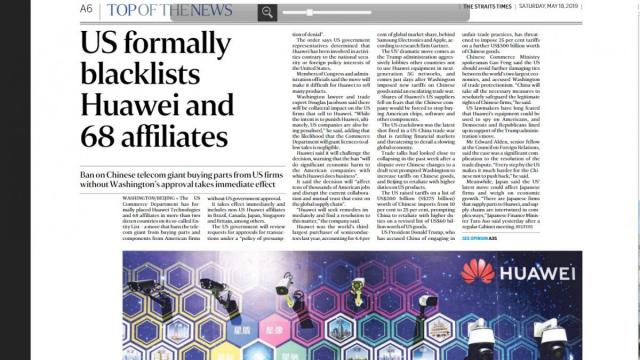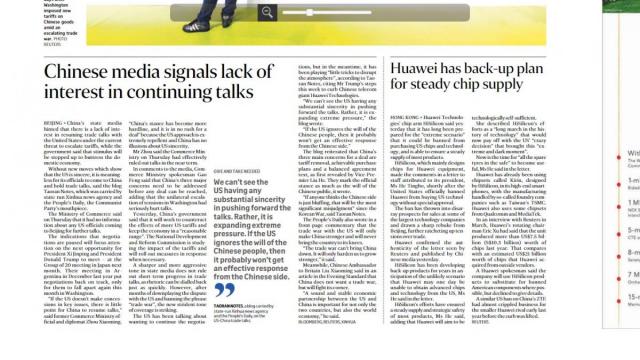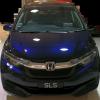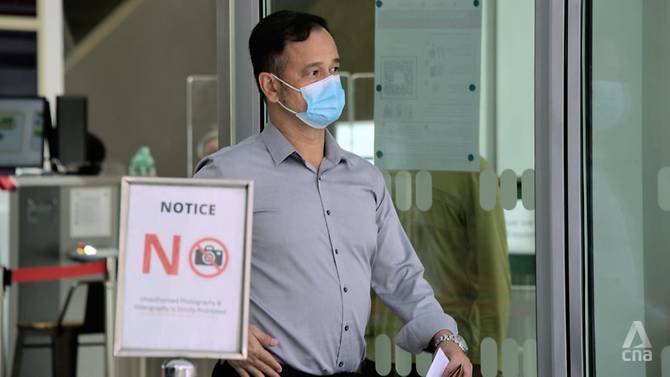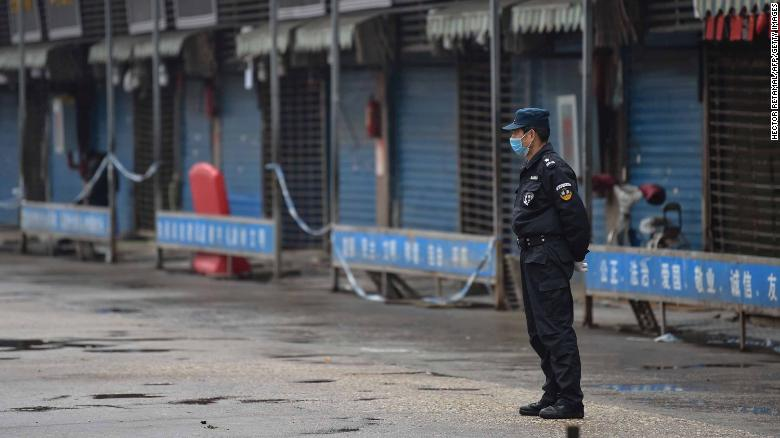Search the Community
Showing results for tags 'ban'.
-
BBC News - TikTok's UK headquarters in doubt amid US pressure https://www.bbc.co.uk/news/business-53462918 I'm no lover of the ccp. But this is really incredible hypocrisy. This is coming from the two governments who collect massive amounts of data on their own citizens as revealed by Edward Snowden. Reportedly to find terrorists. They would love to tap the entire world except that Apple the main handphone used by most Americans refuse to comply with many of their information requests. And Canada, USA, England are tapping all communication cables on both sides of the Atlantic.... And the silly thing is that you can choose not to use wechat, tiktok or huawei phones...
- 309 replies
-
- 11
-

-
.png)
-
Bad news for smokers https://www.channelnewsasia.com/singapore/smoking-banned-more-places-beaches-parks-water-sites-2544736 SINGAPORE: From Jul 1, Singapore will ban smoking at three new types of premises, although enforcement will only start in October to give smokers time to adjust. Smoking will be prohibited at all public parks and gardens managed by the National Parks Board (NParks), PUB’s Active, Beautiful, Clean Waters (ABC Waters) sites, and 10 recreational beaches, said the Ministry of Sustainability and the Environment (MSE), Sentosa Development Corp (SDC) and several statutory boards in a joint release issued on Monday (Mar 7). Together, they cover about 100 sites such as Raffles Place Park, East Coast Beach and Tanjong Beach, joining a list of more than 49,000 places where smoking is banned. These include entertainment outlets, shopping malls, bus stops and common areas in residential buildings. The extension of the smoking prohibition is part of Singapore’s efforts to clamp down on smoking and tackle second-hand tobacco smoke, the authorities said.
- 132 replies
-
- 12
-

-
.png)
-
Hi, I was looking at my G-plate commercial vehicle insurance terms and conditions. Realized that "geographical area" includes West Malaysia and 80 km into Thailand ! So I am planning to drive G-plate into Malaysia without getting the relevant permits from Malaysia side. I wish to know: How is the ban on Singapore commercial vehicles enforced? Is it aggressively enforced, or just another close-one-eye type of regulation? Exactly where do they do they conduct checks?
- 52 replies
-
- mitsubishi
- mitsubishimalaysia
-
(and 6 more)
Tagged with:
-
- 21 replies
-
- 3
-

-
workable here ?
- 14 replies
-
- ban
- cellphones
-
(and 2 more)
Tagged with:
-
To protect the consumer or business owner (and government coffer)? I hope Singapore and other countries will no follow suit. I cannot imagine how much more we need to pay for the same items without competition online (e-commerce and sales via social media). As consumer, we have to exercise due diligences when making purchase online, instead of relying on our givernment to protect us from being scammed. Source: https://www.channelnewsasia.com/asia/indonesia-ban-sale-goods-tiktok-shop-social-media-regulation-commerce-3802491 SINGAPORE: For the past two months, factory worker Subairi has come to rely on TikTok Shop to purchase his daily necessities. From baby formula to cooking oil, he stocks up on these items each payday. But with the announcement that the Indonesian government has banned the direct sales of goods on social media platforms, Mr Subairi - who like many Indonesians go by one name - is worried over the loss of a cheaper shopping alternative. “If TikTok Shop is banned, I will find it difficult to find items that are as cheap as (those sold there),” the 38-year-old from Karawang, West Java told CNA. “On other e-commerce platforms, the service fee is almost 10,000 rupiah (US$0.64) but on TikTok Shop it is totally free, with no conditions.” Mr Subairi added that the flash sales and payday promotions - normally offered at the end of the month when workers receive their salaries - on TikTok Shop make the prices much cheaper. He has been comparing prices of goods across various e-commerce platforms, and found those sold on TikTok Shop to be the cheapest. “Yesterday, I bought baby formula. Elsewhere, the cheapest price was 320,000 rupiah but on TikTok, with various discounts, I could get (the formula at) around 300,000 rupiah,” said the father of two. Meanwhile, TikTok Shop buyer Nadya Aulia Arma told CNA that while she disagrees with the new regulation, she will accept the development and switch to using other e-commerce platforms. “I honestly don't agree, because I will lose a place to buy things at low prices. But if it's for the good of the Indonesian people, that's okay. I'll go back to shopping on Shopee,” she said. On Monday (Sep 25), the Indonesian government announced that it will no longer allow social media platforms to double as e-commerce sites, in order to prevent the misuse of data. "(Social media) can only (be used to) facilitate the promotion of goods or services (but) direct transactions … (and) direct payments are no longer allowed; (social media) can only be used for promotion," said Trade Minister Zulkifli Hasan after a closed meeting on electronic commerce issues. Under the Revised Ministry of Trade Regulation, a minimum import transaction of US$100 will also be imposed on goods purchased from abroad. While the ban has caught the disappointment of buyers, some sellers at physical stores in Indonesia have celebrated the move. Textile seller Iyal Suryadi told CNA that the sale of goods online has reduced his income. “In the local market where we sell our goods, sometimes we only sell one or two pieces of cloth in a week … If it continues like this, don’t even think about growing (the business); just being able to survive is good,” he said. He added that the prices of items sold on TikTok Shop “do not make sense”. “They sell goods at factory prices directly to consumers, not to distributors or resellers. It is true that we have entered the free market, but let's not go too far. “The government must act if it does not want the country's economy to be destroyed. The reason is that the money in this country revolves around the small people like us, not the rich,” said Mr Suryadi, who owns a shop at Pasar Cipeundeuy located in Subang, West Java. Similarly, Mr Raden, a seller at Tanah Abang market in Jakarta, agreed that TikTok Shop has hurt his sales due to the cheap prices offered on the social media platform. However, he told CNA that he disagrees with the new ban and suggested that the sale of items through social media be restricted instead. “(This is) because there are merchants here who also sell through TikTok. They are forced to sell on TikTok because the physical market is starting to be abandoned by buyers,” said Mr Raden, who goes by one name. “In my opinion, TikTok shops should not be banned but restricted. (Instead), foreign products should be stopped and domestic products should be sold.” In response to the ban, TikTok Indonesia said that it will abide by the laws and regulations of the country. "However, we also hope that the government will consider the effect (of the ban) toward the livelihood of six million local sellers and around seven million creator affiliates that use TikTok Shop," a TikTok Indonesia spokesperson was quoted as saying by Tempo on Tuesday. The platform, owned by China's ByteDance, reportedly said that it has received complaints from local sellers and has asked for certainty from the authorities regarding the newly issued regulation. According to Tempo, TikTok said that social commerce emerged as a solution to the problems faced by micro, small and medium enterprises (MSMEs), adding that it believes that TikTok Shop was established to support local sellers to collaborate with local creators in order to boost traffic for their online shops. TikTok has been hit with allegations that its TikTok Shop service is implementing predatory pricing by selling imported goods at significantly lower prices, thus leading to major profit losses for MSMEs who struggle to compete with such prices. Mr Dedi Dinarto, lead Indonesia analyst at public policy advisory firm Global Counsel, told CNA that Indonesia is the first Southeast Asian country to implement regulations prohibiting social media companies from simultaneously operating as e-commerce platforms. “TikTok is expected to be the most affected, as TikTok Shop currently allows Indonesian buyers to make direct purchases within the app, whereas platforms like Facebook, Instagram, and WhatsApp lack built-in transaction features,” he said. However, he noted that small vendors who have benefited from TikTok Shop can still use any social media platforms to advertise their products, even though transactions will now need to be arranged separately between buyers and sellers. “Engaging in transactions outside of the apps may be considered risky, and this will place established e-commerce platforms such as Shopee, Lazada, and Tokopedia as more trusted options for online purchases,” said Mr Dinarto. Meanwhile, speaking to CNA, Jakarta-based economist Bhima Yudhistira from the Center of Economic and Law Studies (CELIOS) said that banning social commerce is just a partial step to help SMEs. “The government also needs to monitor illegal imports through airplane passengers - such as through a service known as Jastip - and also support SMEs by lowering lending rates, increasing domestic purchasing power, and government procurement absorption of SME products,” said Mr Yudhistira. Jastip allows buyers to obtain items available overseas by contracting the services of travellers who can buy and deliver the goods in their travels.
- 21 replies
-
- 5
-

-

-
.png)
-
- social media
- ban
- (and 4 more)
-
It sadden me that these business owners are trying hard to avoid spending money on improving the safety of their workers, by painting a bad picture on the ban of using lorries to ferry workers. I am willing to pay more and accommodate the slight inconvenience for the safety of these foreign workers, who take up shitty jobs shunned by Singaporean. What about you? Singapore business groups warn of 'complexities', more traffic jams if firms banned from ferrying workers on back of lorries Source: https://www.channelnewsasia.com/singapore/complexities-traffic-jams-lorries-ferrying-workers-3669396 SINGAPORE: Any move to eliminate the transportation of workers on the backs of lorries for safety reasons involves "real, practical and operational complexities", a total of 25 business bodies said in a joint statement on Tuesday (Aug 1). The business chambers and associations, covering a wide range of industries, were responding to a call on Jul 24 by various advocacy groups and others for a timeline on banning the practice. That statement followed an accident in mid-July involving a lorry which appeared to be ferrying workers, with 26 men taken to three hospitals. This follows various accidents involving such lorries over the years. The statement from the business community, including the Association of Small and Medium Enterprises, released to the media, said: "In the process of transitioning to safer transportation modes for workers, it is essential to acknowledge that society must be ready to accept a change in the social compact." One consequence of transporting workers more safely would be more traffic on the roads and greater commuter congestion, it added. "The call for regulatory change to eliminate worker transport on lorries is a matter of great concern for us," added the bodies, which cover industries including construction, food manufacturing, marine and logistics. On Jul 24, more than 40 groups, businesses and individuals put out a joint statement calling for the Government to provide a timeline of measures working towards banning the transportation of workers on lorries. They included bodies advocating for foreign workers and other groups, a law firm, a music events firm, a mental health advocacy group and activists for a range of causes. Speaking to TODAY last month, Nee Soon Group Representation Constituency Member of Parliament Louis Ng said that he supports the Jul 24 statement, and had at the July sitting of Parliament also reiterated his call for such a timeline ahead of a ban on the transportation of workers on the backs of lorries. The business community's statement on Tuesday was addressed to Prime Minister Lee Hsien Loong, Acting Minister of Transport Chee Hong Tat and Senior Minister of State Amy Khor. The business groups said that the situation regarding safety in the transporting of workers had improved over the years but presents "real challenges that demand responsible and thoughtful engagement with various stakeholders". "Over the years, since 2011, we have taken significant strides in enhancing transportation safety for our workers, including the latest requirements under the Road Traffic Act, by closely collaborating with the Ministry of Transport and the Ministry of Home Affairs (the Traffic Police) and the relevant authorities. "As a business community, we are proud to share that many of our larger companies have successfully transitioned, either fully or partially, away from transporting workers on the back of lorries." The Road Traffic Act does not allow for passengers to be transported on the back of lorries, however it makes an exception for transporting workers employed by the vehicle's owner or if it is carrying someone injured in an emergency situation. The business groups' statement added that geographical constraints, limited infrastructure and economic realities that certain regions and industries face play a part in necessitating the widespread practice of transporting workers on lorries. "Regulatory changes have the potential to acutely affect industries that have historically relied on this practice, leading to potential delays in completing projects and risking the livelihoods of workers who depend on these industries for their employment." It also stated that the associations are "resolutely committed" to working closely with the Government, relevant authorities, labour unions, and safety experts to develop a "well-considered strategy" to ensure the safety of its workers. The statement ended by saying that the business groups appreciate the public's sense of urgency of addressing worker safety, and that they would "continue to navigate the complexities involved and actively seek innovative ways to enhance worker safety".
- 165 replies
-
- 11
-

-
https://www.techspot.com/news/88304-xiaomi-designated-communist-chinese-military-company-us-government.html Xiaomi designated a 'Communist Chinese military company' by U.S. government U.S. investors could be forced to divest in November By Rob Thubron on January 15, 2021, 8:36 AM 18 comments What just happened? As Donald Trump approaches the end of his term, the president is putting the pressure on a Chinese giant—but this time, it's not Huawei. The outgoing administration has designated Xiaomi, the world's third best-selling phone maker, a 'Communist Chinese military company,' adding it to a blacklist that could force U.S. investors to divest. As noted by Reuters, a 1999 law requires the Defense Department to compile a catalog of companies owned or controlled by the People's Liberation Army. The Pentagon has added 35 companies so far, including chipmaker SMIC. Huawei is on the list, too, due to its telecoms infrastructure business that is worrying some governments. Xiaomi recently announced the Mi 11, its latest smartphone Both Huawei and SMIC are also part of the US Commerce Department's 'entity list', which prevents American organizations from exporting to the blacklisted companies without a government license. Hence the lack of Google Apps and U.S. hardware in the latest Huawei phones. The newly added companies will be subject to an investment ban that forces American investors to divest their holdings on November 11, 2021—assuming the Biden administration doesn't overturn the order. Xiaomi, which was accused of recording users' incognito web browsing last year, currently takes the third-largest share of the global smartphone market, sitting behind number one Samsung and second-place Huawei, according to IDC. Xiaomi, in a statement to The Verge, said that it is "operating in compliance with the relevant laws and regulations of jurisdictions where it conducts its businesses." The spokesperson contends that Xiaomi "is not owned, controlled or affiliated with the Chinese military, and is not a 'Communist Chinese Military Company' defined under the NDAA [National Defense Authorization Act]." The company is reviewing the consequences of the designation before taking action.
-
Local celebrity Gurmit Singh was fined S$800 and banned from driving for three months for speeding on Tuesday (Jun 8). The 56-year-old actor and presenter, best known for his sitcom character Phua Chu Kang, pleaded guilty to one count under the Road Traffic Act for exceeding the speed limit while driving a vehicle. He drove at a speed of 131kmh at about 9.30pm on Apr 12 this year along Woodlands Avenue 12 towards Seletar Expressway, on a road where the limit was 70kmh, the court heard. The prosecutor sought a driving ban and left the sentence to the court. She said Singh has no prior convictions. Singh told the court that he was driving to fetch his son from the workplace he was interning at when he noticed a "flapping sound". "After I got him I wanted him to hear the same sound, so I realised it comes out at 100kmh," he said. "Of course I'm not saying I should drive at that speed at that street, but it was just a short (distance). I don't know how I got 131, I wish I knew, but I just ask the court's understanding that I'm not this reckless driver who does this daily. It's just a one-off thing I wanted my son to hear." District Judge Salina Ishak told him he could have put his son's life in danger, as well as his own. "I understand, your honour. I regret doing what I did," said Singh. Singh recently reprised his role as contractor Phua Chu Kang for a song in support of COVID-19 vaccines. The penalties for speeding for a first-time offender are a jail term of up to three months, a fine of up to S$1,000, or both. This is doubled for repeat offenders. Drivers who are convicted of speeding can be banned from driving for whatever period the court deems fit. Singh, who was named as Gurmit Singh Virk Chainchal Singh, was unrepresented and turned up in a grey long-sleeved shirt and pants.
-
https://www.channelnewsasia.com/news/singapore/pig-blood-why-and-when-was-it-banned-in-singapore-14875344 Pig blood: Why and when was it banned in Singapore? SINGAPORE: You might have eaten it in Taiwan’s night markets, as blood sausages in the United Kingdom or even remember having it here in your pig's organ soup as a child - but this is not food for the faint-hearted. Needed a break from Covid topics. Think old folks will have ate this during good old days
-
Japan Could Ban Sales Of New Gasoline, Diesel Cars In Mid-2030s: Report source: https://www.motor1.com/news/458668/japan-gasoline-diesel-cars-ban/ The country's industry ministry is expected to formalize the deadline soon. The mechanism to curb the effects of climate change is not showing signs of a halt. And of course, the automotive industry, which admittedly contributes to the current mess, is finding ways to reverse the adversities, mostly by switching to selling electric and hybrid vehicles – or at least they won't have a choice. Japan is the latest country to announce a deadline to ban the selling of new gasoline- and diesel-powered cars. This is according to NHK, the country's public broadcaster, and relayed in a report by Reuters. According to the report, Japan is eyeing the mid-2030s for the deadline and is expecting automakers to comply by not selling new fossil fuel-powered vehicles by the said period. It's important to note that Prime Minister Yoshihide Suga has pledged in October that Japan will have zero emissions by 2050 on a net basis. With this, the Land of the Rising Sun is joining the other countries that have set a deadline. Britain, Norway, and Germany have announced so recently, as well as some parts of the United States and Canada. Automakers have already responded to this cause a long time ago, that's why there are more hybrid and electric vehicles now more than ever. These companies know that this is the future, and switching over to electrified vehicles will make them future-proof, as they say. Japan's new deadline, however, will put pressure on its homegrown automakers like Toyota, Honda, Nissan, and Mitsubishi to hasten the R&D timeline for electrification. We've seen new Japanese models, such as the Nissan Ariya EV crossover, this year, so expect more in the near future. NHK reports that Japan's industry ministry is expected to give a formal target for the sales ban by the end of this year.
-
https://edition.cnn.com/2020/03/05/asia/china-coronavirus-wildlife-consumption-ban-intl-hnk/index.html Hong Kong (CNN)A strict ban on the consumption and farming of wild animals is being rolled out across China in the wake of the deadly coronavirus epidemic, which is believed to have started at a wildlife market in Wuhan. Although it is unclear which animal transferred the virus to humans -- bat, snake and pangolin have all been suggested -- China has acknowledged it needs to bring its lucrative wildlife industry under control if it is to prevent another outbreak. In late February, it slapped a temporary ban on all farming and consumption of "terrestrial wildlife of important ecological, scientific and social value," which is expected to be signed into law later this year. But ending the trade will be hard. The cultural roots of China's use of wild animals run deep, not just for food but also for traditional medicine, clothing, ornaments and even pets. This isn't the first time Chinese officials have tried to contain the trade. In 2003, civets -- mongoose-type creatures -- were banned and culled in large numbers after it was discovered they likely transferred the SARS virus to humans. The selling of snakes was also briefly banned in Guangzhou after the SARS outbreak. But today dishes using the animals are still eaten in parts of China. Public health experts say the ban is an important first step, but are calling on Beijing to seize this crucial opportunity to close loopholes -- such as the use of wild animals in traditional Chinese medicine -- and begin to change cultural attitudes in China around consuming wildlife.
- 31 replies
-
- 2
-

-
https://www.straitstimes.com/asia/east-asia/south-korea-to-ban-about-20000-bmw-vehicles-after-engine-fires Singapore BMW owners be aware. SEOUL (REUTERS) - South Korea's transport ministry said on Tuesday (Aug 14) that it has banned some 20,000 BMW vehicles from the streets amid mounting public fears about engine fires. The ban took effect at midnight on Tuesday. The driving ban comes after 27 engines went up in flames between January and July, which prompted BMW’s Korea unit to apologise last week and issue a recall of 106,000 diesel vehicles - including the 520d model - from Aug 20. Amid public concerns over safety, the government order affects about 20,000 BMW cars that are part of the recall but yet to receive safety checks, according to the transport ministry. "I am asking owners of the BMW cars subject to the recall to actively cooperate to prevent bigger accidents, despite your inconvenience," Transport Minister Kim Hyun-mee told a press conference. Those who own the affected vehicles can drive for safety checks, the ministry said, adding that the ban is intended for quicker safety checks rather than punitive action against the owners. Officials at the German automaker identified the root cause as defects in the exhaust gas re-circulation system, while the South Korean government is conducting a separate probe into the case and planning to take legal action if necessary. The recall order would be effective as soon as owners of the affected cars receive a mail notice, as early as Aug 15, the transport minister said.
-
Another indication on how electoral needs are pushing malaysia slowly towards a more non-tolerant society. This is a book on how Islam can work in a constitutional democracy. Written and contributed by academics and scholars on the topic with the foreword by Badawi. http://www.todayonline.com/world/asia/malaysia-bans-book-foreword-former-pm
-
Hot dogs will be banned in Malaysia unless restaurants agree to change their name because they sound too 'dirty' to be halal Published: 15:30 GMT, 18 October 2016 http://www.dailymail.co.uk/news/article-3848196/Hot-dogs-banned-Malaysia-unless-restaurants-agree-change-sound-dirty-halal.html
-
Source: http://www.japantimes.co.jp/news/2016/05/08/asia-pacific/offbeat-asia-pacific/forbidden-fruit-china-bans-erotic-banana-eating-live-streams/#.V1Gg-Hxf1aQ Didn't know People can go bananas over bananas...lol
-
Finally! I have ballot with no success for 10 years. http://www.straitstimes.com/singapore/permanent-balloting-ban-if-you-sell-your-ndp-tickets#xtor=CS1-10 The price for getting caught selling National Day Parade (NDP) tickets is now a permanent ban from being able to ballot again. Previously, the penalty was a ban of three years. Brigadier-General Melvyn Ong, chairman of the NDP executive committee, said in a statement on Tuesday: "Monetising the privilege to be part of the nation's birthday goes against (its) celebratory spirit... Those found to be involved in such activities will be barred from balloting for future NDPs." He added that the committee is working with online sale sites, including Carousell and eBay. There are still cock-sters selling tickets at this time.
-
[extract] Although the 2013 Santa Fe has a new design language called
-
- new model
- discussions
- (and 11 more)




